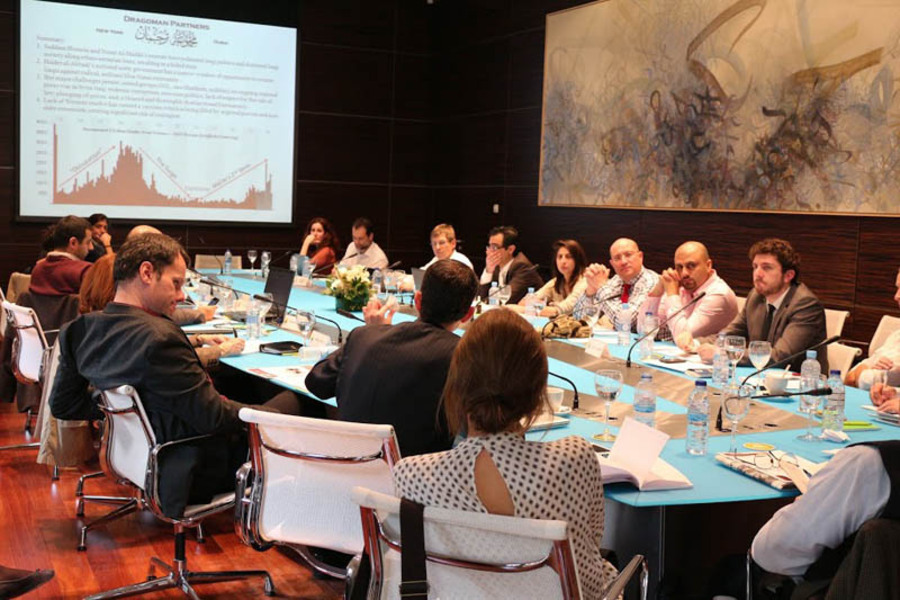International seminar on Iraq
Thirty experts meet at Casa Árabe to analyze the country’s situation and its future
December 09, 2014
MADRID
On December 3, Casa Árabe, FRIDE and the Friedrich Ebert Foundation organized a seminar titled “Iraq at the Crossroads: Internal, regional and international dynamics,” which brought together twelve international experts to discuss the current upheaval and uncertain future of this Arab country.
After the words of welcome given by Eduardo López Busquets, the General Director of Casa Árabe, Giovanni Grevi, the director of FRIDE, and María Pallares, program coordinator of the Friedrich Ebert Foundation, the first session began. It was dedicated to internal dynamics and was moderated by Emma Hooper, a researcher of the CIDOB (International Information and Documentation Center of Barcelona). Myriam Benraad, a researcher at CERI-Sciences Po, discussed “The Perspectives Within Sunni Regions”; Kawa Hassan, a researcher at the HIVOS-Carnegie Center for the Middle East dealt with “The Kurdish Perspective.” Haydar al-Khoei, a researcher at Chatham House, took a closer look at “The Dynamics of Shiite Power.” And BBC journalist Murad al-Batal Shishani spoke about his research on “Cross-border Movements.”
The second session, dedicated to the regional context, and moderated by Haizam Amirah Fernández of the Real Instituto Elcano, began with Fabrice Balanche, a researcher at the University of Lyon 2, who presented his analysis titled “Syria and Iraq: Links and differences.” Ziya Meral, of Cambridge University, continued with “Turkey’s Role and Expectations,” followed by “Iran: How much of an influence,?” given by Mohammad Ali Shabani, a researcher at the University of London’s School of Oriental and African Studies. The session ended with “Saudi Arabia and the Gulf States,” given by Eckart Woertz, a CIDOB researcher.
The third session, moderated by Karim Hauser, who is responsible for Casa Árabe’s Governance Area, focused on the international factors and scenarios for the future. “Military, Political and Economic Negotiations” was given by Ali Khedery, an advisor to various American administrative bodies with Dragoman Partners, followed by the presentation “The United States’ Changing Strategies and Coalitions,” by Jean-Loup Samaan, of the NATO Defense School. “The Different Policies of the EU and Its Members” were discussed by Ellie Geranmayeh, of the ECFR (European Council for Foreign Relations), then ending with an analysis of the “Humanitarian Dimensions and Its Collateral Effects,” given by Pedro Rojo of the Al Fanar Foundation. The final summary and remarks were given by Barah Mikail, a FRIDE researcher. Each session was followed by lively debate and the sharing of opinions amongst the participants.
In the afternoon, the conference “The Iraq Debacle: Unity, federalism, caliphate or partition?” took place, in which three of the twelve speakers participated. A laboratory for regime change and forced democratization since the downfall of Saddam Hussein, today Iraq is talked about as a failed state, officially ruled by the Iraqi central government, but with serious problems of governance in the provinces, which are also subjected to local centrifugal forces, both political and sectarian. The breakdown of the state, coupled with the corruption and lack of governance during the years of Nuri al-Maliki, have left a disastrous legacy behind for the country. With the proliferation of non-state role-players, which include radical groups that have a huge impact on the region’s stability, it is essential to question any analysis that solely focuses on Iraqi institutions. And whatever the solution which is required for Iraq, it will undoubtedly involve both regional and international role-players.

